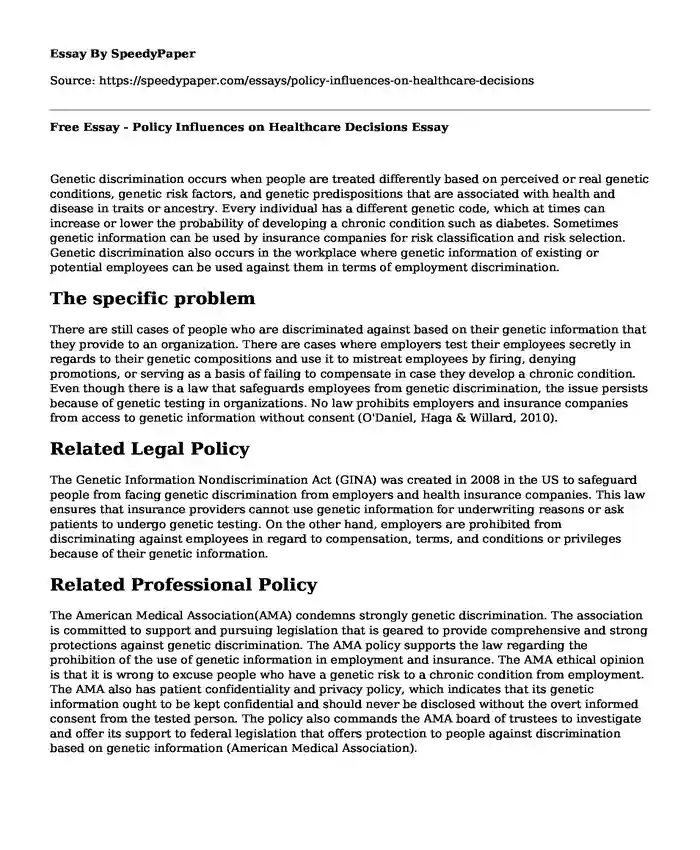
| Type of paper: | Essay |
| Categories: | Discrimination Genetics Diabetes Healthcare policy |
| Pages: | 3 |
| Wordcount: | 682 words |
Genetic discrimination occurs when people are treated differently based on perceived or real genetic conditions, genetic risk factors, and genetic predispositions that are associated with health and disease in traits or ancestry. Every individual has a different genetic code, which at times can increase or lower the probability of developing a chronic condition such as diabetes. Sometimes genetic information can be used by insurance companies for risk classification and risk selection. Genetic discrimination also occurs in the workplace where genetic information of existing or potential employees can be used against them in terms of employment discrimination.
The specific problem
There are still cases of people who are discriminated against based on their genetic information that they provide to an organization. There are cases where employers test their employees secretly in regards to their genetic compositions and use it to mistreat employees by firing, denying promotions, or serving as a basis of failing to compensate in case they develop a chronic condition. Even though there is a law that safeguards employees from genetic discrimination, the issue persists because of genetic testing in organizations. No law prohibits employers and insurance companies from access to genetic information without consent (O'Daniel, Haga & Willard, 2010).
Related Legal Policy
The Genetic Information Nondiscrimination Act (GINA) was created in 2008 in the US to safeguard people from facing genetic discrimination from employers and health insurance companies. This law ensures that insurance providers cannot use genetic information for underwriting reasons or ask patients to undergo genetic testing. On the other hand, employers are prohibited from discriminating against employees in regard to compensation, terms, and conditions or privileges because of their genetic information.
Related Professional Policy
The American Medical Association(AMA) condemns strongly genetic discrimination. The association is committed to support and pursuing legislation that is geared to provide comprehensive and strong protections against genetic discrimination. The AMA policy supports the law regarding the prohibition of the use of genetic information in employment and insurance. The AMA ethical opinion is that it is wrong to excuse people who have a genetic risk to a chronic condition from employment. The AMA also has patient confidentiality and privacy policy, which indicates that its genetic information ought to be kept confidential and should never be disclosed without the overt informed consent from the tested person. The policy also commands the AMA board of trustees to investigate and offer its support to federal legislation that offers protection to people against discrimination based on genetic information (American Medical Association).
Differentiation of the levels of policy and impact variations
The Genetic Information Nondiscrimination Act (GINA) is a law that applies to organizational over the united states. However, this law does not cover all groups. For instance, employers with less than 15 employees are not accorded protection under this law (Zhang, 2017). Further, patients receiving care through the Veterans Health administration are exempted from protection from GINA. On the other hand, the AMA policy only applies to healthcare organizations and healthcare providers, and professionals who are registered in this association.
My take
I believe that the existing policies do not comprehensively protect people from genetic discrimination because no law forbids the collection of genetic information without informed consent by employers and insurance companies. Further, many gaps are evident in the existing policies that ought to be addressed to ensure that genetic discrimination does not continue.
Conclusion
Genetic discrimination persists even with the passage of a nondiscrimination law against the issue. However, there are many loopholes in these policies that allow people to face discrimination based on the genetic information they provide. It is, therefore, important for a policy to be enacted that would ensure that genetic information is collected and used only when individual consent.
References
American Medical Association (AMA). (2013). Genetic discrimination. A report of the American Medical Association Council on Science and Public Health.
O'Daniel, J. M., Haga, S. B., & Willard, H. F. (2010). Considerations for the impact of personal genome information: a study of genomic profiling among genetics and genomics professionals. Journal of genetic counseling, 19(4), 387-401.
Zhang, S. (2017). The loopholes in the law prohibit genetic discrimination. The Atlantic, March, 13, 2017.
Cite this page
Free Essay - Policy Influences on Healthcare Decisions. (2023, Mar 16). Retrieved from https://speedypaper.net/essays/policy-influences-on-healthcare-decisions
Request Removal
If you are the original author of this essay and no longer wish to have it published on the SpeedyPaper website, please click below to request its removal:
- Essay Example: Options Analysis for Toronto Ultimate Club
- Global Warming Topic Essay Example
- Literary Essay on the Raven by Edgar Allan Poe
- Preparing Serial Dilutions of Soil Bacteria, Free Lab Report Example
- Debt-Financed Tax Cuts - Essay Sample on George W. Bush Policy
- Essay Sample on Shadow Banking
- Paper Example. Logins Screens Mobile Applications
Popular categories




